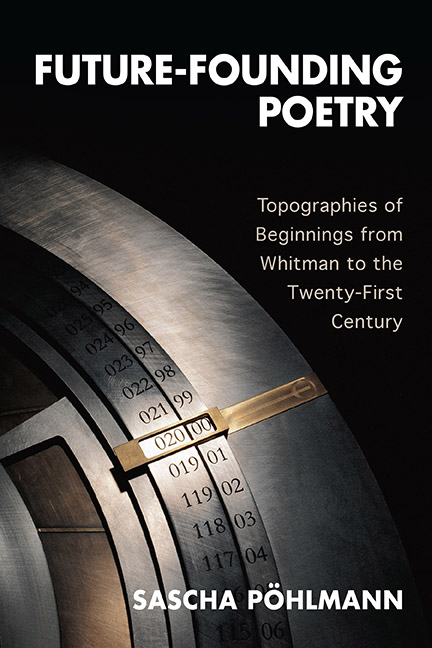Book contents
- Frontmatter
- Contents
- Acknowledgments
- Introduction: On How to Begin, and Where
- 1 Whitman: Beginning American Poetry
- 2 Williams: Beginning Again
- 3 Hughes: Urgent Beginnings
- 4 Rukeyser: Communal Beginnings
- 5 Ginsberg: Defiant Beginnings
- 6 Future-Founding Poetry after 9/11
- Conclusion: On Where to End
- Notes
- Works Cited
- Index
Conclusion: On Where to End
Published online by Cambridge University Press: 25 May 2021
- Frontmatter
- Contents
- Acknowledgments
- Introduction: On How to Begin, and Where
- 1 Whitman: Beginning American Poetry
- 2 Williams: Beginning Again
- 3 Hughes: Urgent Beginnings
- 4 Rukeyser: Communal Beginnings
- 5 Ginsberg: Defiant Beginnings
- 6 Future-Founding Poetry after 9/11
- Conclusion: On Where to End
- Notes
- Works Cited
- Index
Summary
The worst death, worse than death, would be to die, leaving nothing unfinished.
—Keith Waldrop, “Stone Angels”IS THERE AN END TO ALL THESE BEGINNINGS? The last chapter on poetry on 9/11 has shown that the future-founding tradition in American poetry is not of the kind that can only be described historically because it is concluded and has no bearing on the present. Instead, it remains itself a fertile ground for future developments, and thus remains, in more than one sense, true to its beginnings. In this study, I have sought to theorize and analyze a poetic mode of making and marking beginnings—intricately tied to an imagination of place—that was initiated by Walt Whitman and that has been cultivated, cared for, changed, and adapted in different ways and to different ends by a series of other poets ever since. Whitman not only presents himself as the beginner of American poetry itself but also consistently seeks to make beginnings in his poetry (and prose) that will in turn set the framework for future beginnings, especially with regard to fusing aesthetics and politics in this future-founding mode. However, despite its dedication to openness and flexibility, Whitman's influential poetics of perpetual beginnings becomes problematic for the modernists, who are just as devoted to “making it new,” but who find Whitman a rather difficult predecessor for their own respective projects. Rather than ignore Whitman altogether, as other modernists do, William Carlos Williams is looking for methods of beginning again that actively engage the Whitmanian tradition, and he embraces a future-founding poetics of iterative beginnings that emphasizes in its own way the possibility and necessity of making beginnings again and again, using the town of Paterson as a place for these beginnings. While Williams retains—among other aspects—Whitman's categorical resistance to finality, Langston Hughes cannot cultivate such openness in the same way in his future-founding poetry. Instead, he offers urgent beginnings that are often geared toward an actual goal, and which are determined by the teleology of political desire regarding both African-American and proletarian empowerment. Hughes highlights the importance of the dream as a concept that combines future and present, but he also insists that the fulfillment of this dream must not be deferred indefinitely.
- Type
- Chapter
- Information
- Future-Founding PoetryTopographies of Beginnings from Whitman to the Twenty-First Century, pp. 353 - 356Publisher: Boydell & BrewerPrint publication year: 2015



